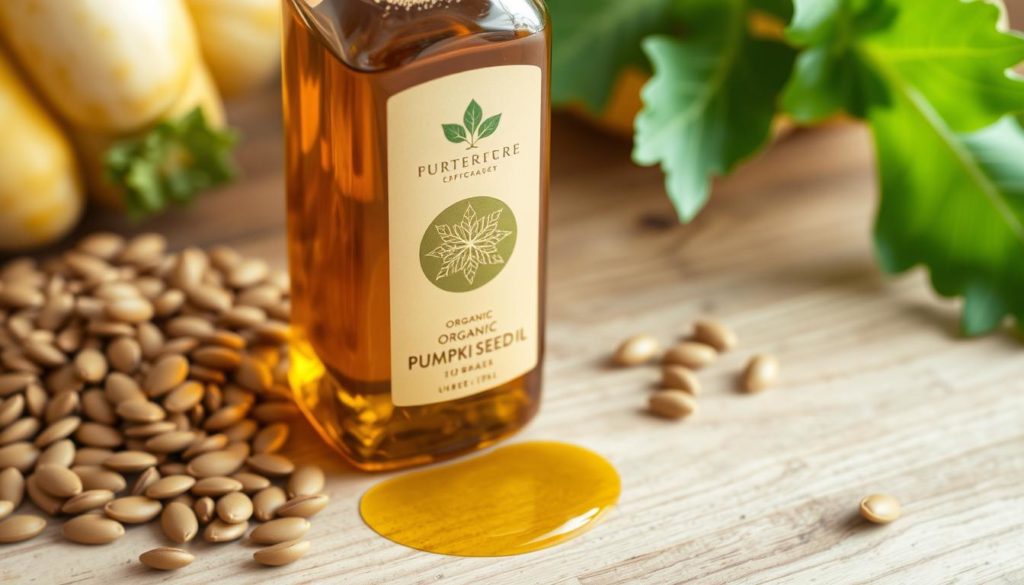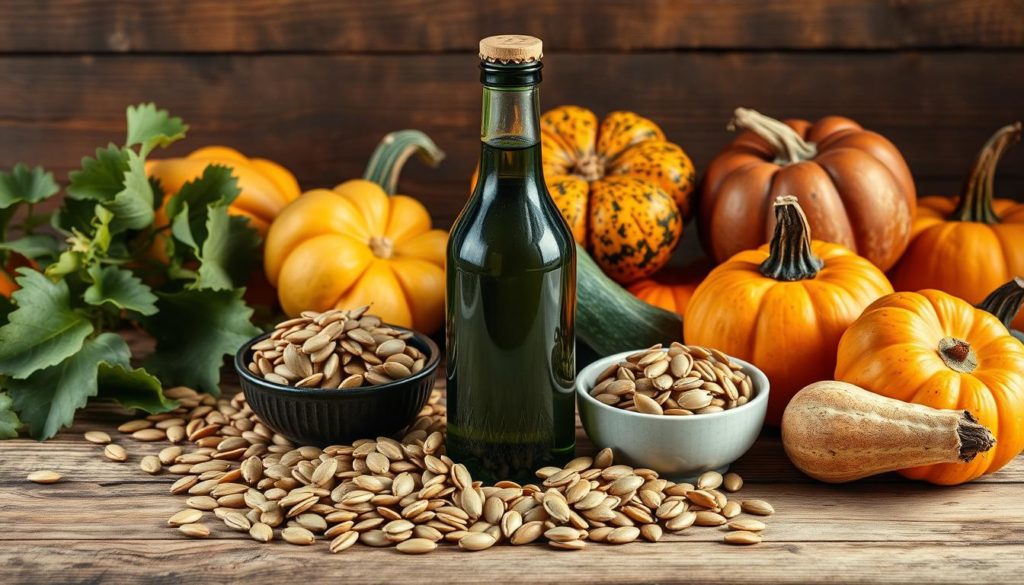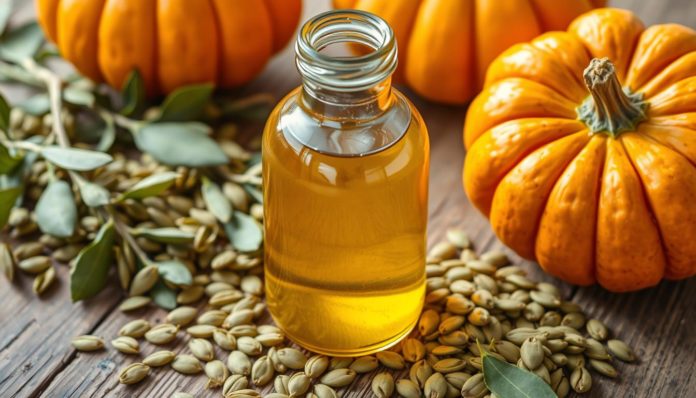Pumpkin seed oil, often called “liquid gold,” is very rich in nutrients. It has up to 50% essential fatty acid linoleic acid. This makes it a super nutritious oil. It’s used for many health benefits. These range from heart and prostate health to enhancing skin and hair.
We’ll explore the uses of pumpkin seed oil more closely. It can be a great addition to your daily life for better health. It’s good for food lovers wanting to spice up their salads. It’s also great for those looking for natural skincare and haircare solutions. Pumpkin seed oil has benefits for everyone.
Let’s begin to learn more about pumpkin seed oil. We will see how it can improve your life in many ways.
What is Pumpkin Seed Oil?
Pumpkin seed oil comes from the seeds of pumpkins. It’s a popular natural product known for its health benefits. People use it for cooking and on their skin because it’s full of good nutrients.

The Extraction Process
How the oil is made is important for its quality. First, the seeds are cleaned and roasted. Then, they’re pressed to get the oil out.
Using a cold-pressed method keeps more nutrients in the oil. This makes it better than oils made with other methods.
Cold-Pressed vs. Refined
Cold-pressed pumpkin seed oil is different from refined oils. It’s made at cooler temperatures, keeping the good stuff in. But refined oils might lose some nutrients because of heat or chemicals.
- Cold-Pressed Pumpkin Seed Oil: Pressed at low temperatures to keep most benefits. It’s known for its nutritional value.
- Refined Oil: Might be made with heat or chemicals, losing some nutrients. They’re cheaper but not as healthy.
Knowing the difference helps people choose the right oil for their needs.
Health Benefits of Pumpkin Seed Oil
Pumpkin seed oil is getting noticed for its health benefits. It’s packed with essential nutrients and bioactive compounds. This oil is versatile and great for overall health.
Rich in Nutrients
Pumpkin seed oil has lots of vitamins, minerals, and fatty acids. It has vitamin E, zinc, omega-3, and omega-6 fatty acids. These are key for good health.
These nutrients help the body in many ways and promote wellness. The oil’s antioxidants help fight oxidative stress and inflammation.
Heart Health
Pumpkin seed oil is good for your heart. Studies show its healthy fats can lower bad cholesterol and raise good cholesterol. This helps manage blood pressure and lowers heart disease risk.
Its nutrients, like magnesium and potassium, boost heart function. They keep the heart healthy.

Prostate Health
Pumpkin seed oil has big benefits for prostate health. Research says it can ease benign prostatic hyperplasia (BPH) symptoms. This is common in older men.
The oil’s zinc and bioactive compounds are good for the prostate. Regular use can reduce inflammation and improve urinary function. This supports prostate health.
| Nutrient | Benefits |
|---|---|
| Vitamin E | Antioxidant, skin health |
| Zinc | Prostate health, immunity |
| Omega-3 fatty acids | Heart health, anti-inflammatory |
| Magnesium | Cardiovascular function, muscle health |
Using Pumpkin Seed Oil for Skincare
Exploring the benefits of pumpkin seed oil for skincare reveals its amazing qualities. It deeply moisturizes and fights aging. Made from pumpkin seeds, it is full of essential fatty acids and vitamins. These are key for a healthy, glowing skin.
Moisturizing Properties
Pumpkin seed oil has a high amount of fatty acids. This gives it great moisturizing properties. Linoleic and oleic acid are among these. They go deep into the skin, ensuring it stays hydrated for a long time.
These acids strengthen the skin’s defense, protecting it from harmful elements. They also keep moisture in. With regular use, your skin becomes soft, flexible, and hydrated.
Anti-Aging Benefits
Pumpkin seed oil for skincare is also known for its anti-aging benefits. It’s filled with antioxidants like vitamin E and carotenoids. These fight off free radicals that cause early signs of aging. Plus, the oil’s zinc and vitamin A boost collagen production. Collagen is vital for skin elasticity and firmness.
Together, these ingredients lessen fine lines and wrinkles. They help maintain a youthful, bright skin appearance.
In summary, adding pumpkin seed oil to your skincare routine offers great moisturization and anti-aging advantages. It ensures your skin stays nourished, safe, and looks young.
Benefits of Pumpkin Seed Oil for Hair
Pumpkin seed oil is great for your hair. It’s full of important nutrients that help the scalp and hair follicles. This results in thicker, stronger, and shinier hair.
Nourishing Hair Growth
The richness of pumpkin seed oil is its secret. It’s full of fatty acids, antioxidants, and vitamins. These keep your hair looking healthy.
- Fatty Acids: Omega-3 and omega-6 in the oil moisturize the scalp and prevent dryness.
- Antioxidants: Antioxidants, like vitamin E, fight off damage and encourage a healthy scalp for hair to grow.
- Zinc: Zinc aids in hair growth and repair. Not having enough zinc can lead to hair loss.
Using pumpkin seed oil for hair care keeps your scalp healthy. A healthy scalp is key for growing strong hair.
Putting pumpkin seed oil on your scalp can boost blood flow. This encourages hair growth. The oil also fights inflammation, which helps with scalp issues like dandruff.
Additional Benefits
- Improved Hair Texture: Using the oil regularly makes hair softer and shinier because of the vitamin A.
- Reduced Hair Shedding: Some people say pumpkin seed oil has helped them lose less hair and made it denser.
If you want a natural boost for your hair, try pumpkin seed oil. It can really make a difference in how your hair looks and feels.
How to Incorporate Pumpkin Seed Oil in Your Diet
Adding pumpkin seed oil to your diet is simple and rewarding. This oil is versatile and enhances the flavor of many dishes. Let’s look at how to use pumpkin seed oil in your cooking.
As a Cooking Oil
Pumpkin seed oil gives meals a rich, nutty taste. It is best for low-heat dishes to keep its flavor and nutrients. Try it on roasted veggies, grain bowls, or as a final touch on soups and pasta. Its aroma makes these dishes even better and healthier.
In Salad Dressings
Pumpkin seed oil takes salads to a new level. It mixes well with balsamic vinegar, lemon juice, and honey. Make a dressing by mixing it with vinegar, then add salt and pepper. This not only tastes great but adds to your health, too.
Using pumpkin seed oil in your cooking or in dressings can boost your health and diet. It’s an easy way to make your meals more flavorful and nutritious.
Pumpkin Seed Oil Supplements
Pumpkin seed oil supplements are a good choice for those who don’t like the oil itself. They come in capsules and softgels. This makes it easy to enjoy pumpkin seed oil’s benefits every day.
Capsules and Softgels
When it comes to picking between capsules and softgels, it’s all about what you prefer. Both types offer great health perks. These include better heart health and prostate support without the oil’s taste.
Capsules can be made of gelatin or vegetable cellulose, fitting various eating plans. Softgels are known for being easy to swallow. They also get absorbed faster.
Dosage Recommendations
Following the right dosage for pumpkin seed oil supplements is key. Adults should take 1-2 capsules or softgels daily, based on the supplement’s strength. Always look at the product instructions and talk to a doctor to find out the best dose for you.
Sticking to the recommended dose makes sure you get all the good stuff from pumpkin seed oil. And you won’t have any side effects.
| Supplement Type | Material | Benefits |
|---|---|---|
| Capsules | Gelatin or Vegetable Cellulose | Suited for different diets, tasteless |
| Softgels | Gelatin | Easy to swallow, faster absorption |
Choosing the Best Organic Pumpkin Seed Oil
Selecting the best organic pumpkin seed oil involves several important factors. Knowing these will guide you to make a smart choice. This ensures you enjoy all the benefits of this nutrient-packed oil.
What to Look For
Knowing what to look for in pumpkin seed oil is key to finding the best quality. Here’s what you should consider:
- Purity: Choose oils that are 100% pure without any additives or mixed oils.
- Extraction Method: Cold-pressed oils keep more nutrients than refined methods.
- Origin: Look for oils from places known for premium pumpkin seeds, such as Austria and Slovenia.
Top Brands
Certain brands of pumpkin seed oil are known for their quality, sustainability, and nutrition. Here’s a look at some of the best:
| Brand | Purity | Extraction Method | Origin |
|---|---|---|---|
| La Tourangelle | 100% Pure | Cold-Pressed | France |
| Now Foods | 100% Pure | Cold-Pressed | USA |
| Bio Planète | 100% Pure | Cold-Pressed | Germany |
Keeping these factors and brands in mind will help you choose the right organic pumpkin seed oil for your needs.
Possible Side Effects and Precautions
Pumpkin seed oil has many health benefits. But, it’s crucial to know the side effects of pumpkin seed oil. Some people might get stomach cramps or diarrhea if they consume it in large amounts. There’s also a chance that putting it on the skin could irritate or cause allergic reactions in some.
Users should be cautious with precautions with pumpkin seed oil use. Those allergic to pumpkins should avoid it. For those taking diuretic meds, talk to a doctor before using the oil. It’s crucial for pregnant and breastfeeding women to also get medical advice first.
Pumpkin seed oil could also affect certain medical conditions. People with low blood pressure, beware, as it may lower it even more. If you’re on meds for blood thinning, the oil might amplify their effect.
Yes, the health benefits are significant, but safety comes first. Always start with small amounts to see how your body reacts. And, if you have health concerns or are on meds, talking to a healthcare expert is important.
Pumpkin Seed Oil: Benefits and Uses Guide Conclusion
Pumpkin seed oil is packed with benefits for health and personal care. It’s rich in nutrients, supports heart and prostate health. It’s also great for your skin and hair. This makes pumpkin seed oil a great choice for your wellness routine.
You can add pumpkin seed oil to your meals or salad dressings. This is a tasty way to enjoy its health perks. Capsules and softgels are another way to take it, especially for exact dosages. Always choose organic pumpkin seed oil to avoid additives and impurities.
Before using pumpkin seed oil, talk to a health expert. They can help you use it in the best way for your needs. This guide aims to give you knowledge to make wise choices. By doing so, you can improve your diet and personal care practices.
FAQ
What is pumpkin seed oil and how is it extracted?
Pumpkin seed oil comes from pumpkin seeds. It uses a cold-pressed method to keep nutrients. This method avoids chemicals and high heat.
What are the nutritional benefits of pumpkin seed oil?
This oil is packed with vitamins A, E, and K. It has essential fatty acids and minerals. These help with heart and prostate health.
Can pumpkin seed oil be used for skincare?
Absolutely, pumpkin seed oil is amazing for skin! It moisturizes and has lots of antioxidants. Your skin stays hydrated, becomes firmer, and fine lines reduce.
How does pumpkin seed oil benefit hair?
It nourishes hair and helps it grow. It’s good for the scalp and hair roots. The nutrients make hair strong and improve its texture.
How can I incorporate pumpkin seed oil into my diet?
Use it as a cooking oil for dishes cooked at low heat. Or add it to salad dressings. It gives a unique nutty flavor and health benefits.
Are there pumpkin seed oil supplements available?
Yes, there are supplements like capsules and softgels. If you’d rather not use the oil, these are an option. Always look at the dosage and pick quality supplements.
What should I look for when choosing organic pumpkin seed oil?
Pick cold-pressed, 100% pure oil with no additives. Check its certifications and read brand reviews before you choose.
Are there any side effects or precautions when using pumpkin seed oil?
It’s mostly safe, but allergies or digestive problems can occur. Always talk to a healthcare provider first if you have conditions or take other meds.


